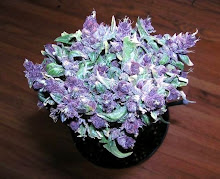Today, I'm going to highlight Matthew Engel's "Why it's Time to End the War on Drugs" in the Financial Times.
For decades many academics and professionals have regarded the current blanket prohibition on recreational drugs (though not alcohol or tobacco) as absurd, counter-productive and destructive. But there has never been any political imperative for change, and a thousand reasons to do nothing.
For nearly 40 years, since the habits established in the 1960s took root in society, there has been a stand-off. Across the free world, and most of the unfree, anyone seriously interested in smoking, snorting, swallowing or injecting illegal substances can acquire the wherewithal with a little effort, and proceed without much fear of retribution, particularly if they are wealthy enough. Police and politicians say they are interested in punishing the suppliers and not the users. This is an intellectual nonsense, but it has suited everyone who matters. The drug users don’t care; governments have felt no pressure to attempt a politically dangerous reform; and above all it suits the international gangsters who control the drug business, which offers massive rewards and – for them – minimal risks.
It's worth reading through the whole thing but I'm just going to highlight one more part which I feel is important:
The case for legalisation is not about allowing baby-boom couples to enjoy a joint after a dinner party without drawing the curtains or being obliged to visit a dodgy bloke called Dave. Decriminalisation or even legalising cannabis on its own would achieve little. Something more radical is required. The crucial issue concerns the supply chain: the way prohibition has enriched and empowered gangsters, corrupt officials and indeed wholly corrupt narco-states across the planet. It was a point made eloquently by the Russian economist Lev Timofeev, when interviewed by Misha Glenny for his book about global organised crime, McMafia. “Prohibiting a market does not mean destroying it,” Timofeev said. What it means is placing a “dynamically developing market under the total control of criminal corporations”. He called the present situation a threat to world civilisation, which international public opinion had failed to grasp.
The more I see these articles, the more I smile and I've been smiling an awful lot lately.
Please pass this article along, every little bit of information helps.
For nearly 40 years, since the habits established in the 1960s took root in society, there has been a stand-off. Across the free world, and most of the unfree, anyone seriously interested in smoking, snorting, swallowing or injecting illegal substances can acquire the wherewithal with a little effort, and proceed without much fear of retribution, particularly if they are wealthy enough. Police and politicians say they are interested in punishing the suppliers and not the users. This is an intellectual nonsense, but it has suited everyone who matters. The drug users don’t care; governments have felt no pressure to attempt a politically dangerous reform; and above all it suits the international gangsters who control the drug business, which offers massive rewards and – for them – minimal risks.
It's worth reading through the whole thing but I'm just going to highlight one more part which I feel is important:
The case for legalisation is not about allowing baby-boom couples to enjoy a joint after a dinner party without drawing the curtains or being obliged to visit a dodgy bloke called Dave. Decriminalisation or even legalising cannabis on its own would achieve little. Something more radical is required. The crucial issue concerns the supply chain: the way prohibition has enriched and empowered gangsters, corrupt officials and indeed wholly corrupt narco-states across the planet. It was a point made eloquently by the Russian economist Lev Timofeev, when interviewed by Misha Glenny for his book about global organised crime, McMafia. “Prohibiting a market does not mean destroying it,” Timofeev said. What it means is placing a “dynamically developing market under the total control of criminal corporations”. He called the present situation a threat to world civilisation, which international public opinion had failed to grasp.
The more I see these articles, the more I smile and I've been smiling an awful lot lately.
Please pass this article along, every little bit of information helps.

No comments:
Post a Comment